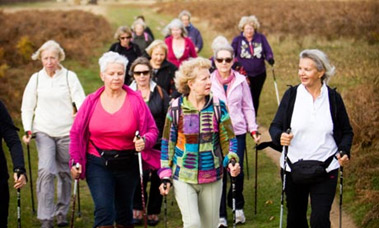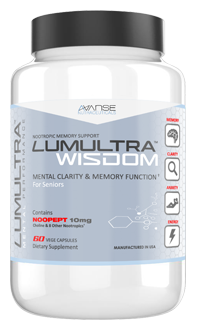
It’s no secret that aging is associated with cognitive decline – and that sure is scary. As we reach our 50’s and 60’s, we are afraid of becoming fragile, weak and dependent. We become frightened by the idea that our once bubbly and wise selves will be incapable of performing simple, daily activities – forcing us to rely on others for help. On top of all this, the thought of losing our memory, focus and learning abilities is beyond terrifying.
And for those of us who have parents or grandparents, it’s equally as scary to have to witness our loved ones experience symptoms of mental decline. However, scientists and researchers have been focusing on finding prevention methods and there continues to be promising news.
So you’ve landed on this article expecting to see a boring ol’ list of 6 tips that you should follow. Well, not today! The following read is a guidance program that consists of 6 letters designed carefully for you to learn something new each day and to accumulate that information over the week. Since you only have one letter to read per day, you will have the time to focus and fully understand each helpful hint. This will make the process much more manageable.
Instructions:
Today you will start by reading the first letter (Advice #1) – take notes and/or discuss the read with a family member if you feel like that would a helpful step towards remembering the information.
Tomorrow you will read the second letter (Advice #2) and so forth. Keep in mind that this process is cumulative, meaning you should add on information as the days go by.
At the end of the week, you will have learned and understood the importance of 6 lifestyle advices that you should consistently practice and keep in mind in order to enhance your mental edge and keep your brain healthy. Let’s get started!
Advice #1 – Train Your Brain

Hello and welcome!
Congratulations on taking the step to read this letter today – you are now beginning your journey towards developing a healthier brain and a stronger mental edge. Today’s topic is mental stimulation aka how to train your brain. You will be provided with a series of different activities that you can try everyday to challenge your memory, concentration and learning skills. After reading this letter, you will also form a better understanding of how daily brain exercises can help keep your mind sharp and focused.
Professor Henry Brodaty, a leading dementia researcher who has studied Alzheimer’s and related mental decline issues for over 30 years says that people who train their brain and thus use it more are “less likely to get Alzheimer’s”.1
Still not convinced?
To support Professor Brodaty’s point, a study including senior volunteers at the University of Sydney’s Brain & Mind Research Institute was conducted. In this study, older folks were asked to complete a sort of ‘brain workout’, which included a variety of different brain training exercises. After the training, the participants underwent a brain scan and the results showed that those who did the ‘brain workout’ had improved connectivity in the hippocampus – area of the brain in charge of memory and learning.1
So how does mental stimulation make your brain sharper and less likely to deteriorate?
Well, a research study at the University of Berkeley, California answers the question with their results, which were published in the Archives of Neurology.2 It seems that people who engaged in cognitive stimulating activities had a lower buildup of beta-amyloid – atype of toxic protein that is present in those with Alzheimer’s.2
Now that you understand how daily mental stimulation supports brain health, what types of activities should you engage in? Well, there’s a lot to choose from so take your pick.
- Get in touch with your younger self and play some games. Crossword puzzles, for instance, challenge the brain and keep your neurons activated. You can even play Sudoku while the kids are watching TV. Or get the whole family involved and enjoy a board game after dinner! Play for an hour or two, 3-4 times a week.
- The most effective of way to maintain or improve memory is by practicing memorization. This one’s easy! Try to remember the different capital cities of every country that you know or recall all 50 U.S. states. Also, next time you get someone’s phone number or address, write it down and try to remember it. With phone numbers, it’s best to split them into 3-digit intervals – this makes it more manageable.
- Keep learning! If you think that being 60 means you’re too old to start learning something new, you are beyond wrong! It doesn’t have to be something as complicated as learning a new language or an instrument, but picking up the newspaper and learning about the world’s current events counts.
So to recap, mental stimulation benefits the brain by keeping it alert and improving memory capacity. You can engage in activities such as board games, reading and memorizing to train your brain at a daily basis. And that’s all for today, folks! See you back here tomorrow.
Regards,
Everyone at LumUltra
Advice #2 – Always Stay Social

Hey there and welcome to your second day back!
Today we will discuss how keeping an active social life and maintaining social engagement can improve your brain’s ability to focus, stay alert and retain information.
We are born as social creatures, which is why we have a craving for love and company. Isolation leads to sadness, loneliness and you guessed it, mental decline. Our brains are designed to interact, speak and engage with others, so to completely ignore the importance of socializing would be a deadly mistake.
Being social basically exercises the mind to think, reflect and memorize. While we speak to others, the little nerve cells in our brain light up and start shooting everywhere. This keeps our brain active and healthy.3
And yes, this has totally been proven through research.
A study conducted in the University of Michigan compared the brain frequencies and cognitive abilities of those who preferred to stay alone to those who make socializing as part of their daily routine.3 The results were totally expected – people who socialized more could process information better and had a larger memory capacity.3
So here’s what you should do next:
- Pick up that old phone book and make a few calls, arrange a plan with a friend (or many!) and follow through with the get-together.
- Check out your local senior center, where there are tons of other people who you meet and socialize with. Make friends, have fun, laugh a little and enjoy!
- Join a club: There are so many to choose from – from choir groups, chess clubs, gardening clubs, dance clubs to even golf clubs.
- Join a volunteer program – you can do this online with a laptop or house computer.
- Chat with your neighbors and invite them over for dinner.
- Get your child or grandchild to help you set up a Facebook account. It will be pretty exciting to find some friends who you haven’t seen in a long, long time!
Let’s summarize today’s lesson – stay social and you will notice improved brain function. You can do this by eating out with the neighbors or joining a gardening club. Whatever it is, keep it social!
Regards,
Everyone at LumUltra
P.S. Don’t forget yesterday’s lesson! Now you have two tips to keep in mind: train your brain and stay social.
Advice #3 – Get Your Body Movin’

Hey there!
Ready for another healthy brain-boosting tip? Today’s talk will cover the importance of exercise and the different exercise routines that you can do even at 60+. Don’t groan, you knew the whole fitness talk was going to come up sooner or later! Relax, we’re keeping this super easy and simple. Let’s get right into it.
Fun fact guys: Daily physical exercise reduces the chance of developing Alzheimer’s by 50%.4
So basically, taking a morning walk everyday or playing doubles tennis with the neighbors decreases your likelihood of getting such a serious illness – Alzheimer’s – by half. HALF!
Need more evidence?
A study has shown that children and teens who go to school by foot tend to be more proactive, have better memory and perform better on tests.4
Why?
Exercise stimulates blood flow throughout the body, including the brain, which leads to increased energy and improved cognitive function. When we get our heart rates up and exercise, we are also releasing “growth hormones” which are needed for the production of neurotransmitters such as acetylcholine (in charge of learning).
The trick here is choosing which type of exercise is best suited for you. If you have a knee condition or high blood pressure, then you’re obviously going to go for the lighter exercise regimes (i.e. taking a morning walk). Here are a few examples of senior-friendly workouts:
- Yoga
- Swimming
- Taking morning or evening walks
- Pilates
- Aerobics or aqua aerobics
- Go to a senior playground – these have specially designed machines that are appropriate for older folks.
- Tai Chi
So there you have it! Remember that with exercise, you need to make it a habit in order to notice significant results. Choose a workout and stick with it for at least a month or two. Start off by exercising 2-3 days a week and move up to 4-5 when you feel ready to.
Regards,
Everyone at LumUltra
P.S. Now you have three tips to keep in mind: train your brain, stay social, and get exercising.
Advice #4 – Get Quality Zzz’s

Hello and welcome once again to another advice on how to keep the senior mind sharp! Today we will talk about how getting quality sleep can help boost certain cognitive function as well as how to improve your sleeping habits.
Sleep is a basic human need. Without it, our energy battery basically runs out, which leads to a lack of focus, motivation, and productivity. When we get enough good-quality sleep, both our brain and body are re-charged and ready to perform at their optimal levels. Sounds simple enough, right? Well, not quite.
The whole 7-8 hours of sleep per night thing is something that we’ve all heard before – and yes it continues to the recommended amount of time that adults should sleep for each night.
However, as we age, not only does it become more difficult to fall asleep but we also begin encountering problems staying asleep. The reason for this is simple and nothing to be fearful of: the older we get, the less hormones there are available in the body to induce sleep.5 Melatonin, for instance, is a hormone that regulates our sleep and wake cycle. Those who are above the age of 65 usually have lowered melatonin production, which is why we tend to wake up earlier than expected and have a hard time getting back to sleep.5
And what happens when we don’t get the Zzz’s we need?
Well, a study from the University of Pennsylvania showed that repeated sleeplessness can lead to nerve cell injuries. This would then cause lowered cognitive function and inability to concentrate. Additionally, getting short, insufficient periods of sleep is also associated with smaller brain volume. Lastly, researchers have found that most of our brain’s toxins are released at night via the glymphatic system. So if you’re not giving your body enough time to sleep, you’re not cleansing the toxin buildup in your brain.6
The good news is that getting adequate amounts of quality sleep leads to better concentration and memory retention.7 So what are some ways that you can the quality of your sleep and make sure that you’re getting enough shut-eye?
- Form a pre-bedtime routine. This can involve taking a relaxing bath (NOTE: your baths before bed should never be too hot as this would increase body temperature), lighting up lavender scented candles or reading a good book.
- Stick to a certain time. Just like you used to set a bedtime for your kids, do the same for yourself. Lights off by 10 P.M., no excuses.
- Don’t watch TV before bed. This only stimulates brain activity and gets the neurons firing.
- Take a herbal sleep supplement.
And we’re done for today. Don’t forget to shut off the TV a few hours before sleeping and get into bed early tonight – it’ll be worth it!
Regards,
Everyone at LumUltra
P.S. Now you have four tips to keep in mind: train your brain, stay social, get exercising and catch some decent Zzz’s.
Advice #5 – Pay Attention To What You Eat

Hello there! Happy to have you with us today to discuss advice #5.
Nutritional care is very important when it comes to maintaining a healthy and sharp brain. This applies to everyone but it’s particularly important for us older folks, because our body’s demands change as we age.
If you’re 60+ and reading this then remember the golden rule: less calories, more nutrients. In order to achieve this you should aim to eat lots of veggies, lean proteins, fruits, whole grains and dairy (preferably low-fat). This should start by replacing bad meal options with healthier ones i.e. instead of getting pizza or Chinese take-out, eat a balanced dish of grilled chicken breast, salad and a side of beans.
“But what if I have a condition that require a particular diet?”
If you suffer from diabetes, dental problems (i.e. having to wear dentures), then it’s important to consult with a trained nutritionist to help figure out a healthy and appropriate diet to fit your needs.
“What about vitamins? Should I take a multi-vit?”
The two most important vitamins you should be taking are Vitamin B12 and Vitamin D.8 That’s because as we get older, our stomach produces lower amounts of gastric acid, which is needed to absorb Vitamin B12. Also, our skin becomes less capable of converting sunlight into Vitamin D. To make up for this, consult with your physician about taking vitamin supplements.
Regards,
Everyone at LumUltra
P.S. Now you have five tips to keep in mind: train your brain, stay social, get exercising, catch some decent Zzz’s and eat healthy.
FINAL Advice – Use A Brain-Boosting Supplement

Hey there guys!
We are super excited to be sharing this last advice with you today. With the world moving faster than ever (I mean what the heck is an “Instagram”, am I right?), it’s no shock that us seniors want to keep up by having a mind sharper than ever before. While following the lifestyle tips above will certainly help, those changes may not always be enough. We truly believe in the use of certain supplements to help boost cognitive function and support brain health. That’s because certain ingredients have been shown to bring remarkable results, particularly for the older generation, to improve mental performance, memory capacity, alertness, mental energy and focus.
To dive straight into it, here are some of our favorite picks:
- Panax GinsengMeet the most acclaimed herb from the Eastern world of medicine, Panax Ginseng. Ginseng has been highly praised for over 4,000 years because its benefits are manifold and it consistently delivers results. This tonic can be used to reduce anxiety, increase mental energy, boost alertness, improve thinking skills and enhance memory. Beyond its brain-boosting benefits, this herb can also be taken to improve the immune system, treat diabetes and (holy moly…) treat cancer.
- L-Theanine
This amino acid contains calming properties, meaning it doesn’t just work to reduce stress but it can also enhance focus and learning. Now that we’re older, learning new things and concepts can be pretty frustrating. Setting up cable TV is hard enough so things like using the Internet to get information becomes out of the question. This doesn’t necessarily need to be the case. Supplements such as L-Theanine will give your mind the relaxation and focus it needs to understand new information and remember it.
- NoopeptNoopept has the potential to be a total game-changer in your life. Not only is it the most potent cognitive boosting supplement available in the world, but it’s also a great pick for those who want to keep their aging minds young and sharp.
Firstly, Noopept contains antioxidant agents that can protect your neurons from damage. Secondly, it has the power to increase acetylcholine and NGF (Nerve Growth Factors) levels in the brain, which would lead to improved learning and memory capacity.
You can buy these supplements separately but why go through such a hassle when you can get all of them and more from one, high-quality, specially formulated supplement – Wisdom. Wisdom’s brain boosting formula is designed particularly for the 60+ mind to optimize memory, increase clarity, sharpen focus, reduce anxiety and boost mood. Take control of your life and start getting excited for the upcoming years ahead…because they’re only going to get better with Wisdom.
P.S. Now you have SIX tips to keep in mind: train your brain, stay social, get exercising, catch some decent Zzz’s, eat healthier and USE A BRAIN-BOOSTING SUPPLEMENT.
The frustrations of aging should not hold you back from living the life you want to – even at 60. By following the 6 pieces of advice given above, you will regain the confidence, energy and mental power you need to feel your best every single day. Let Wisdom help you get there!
